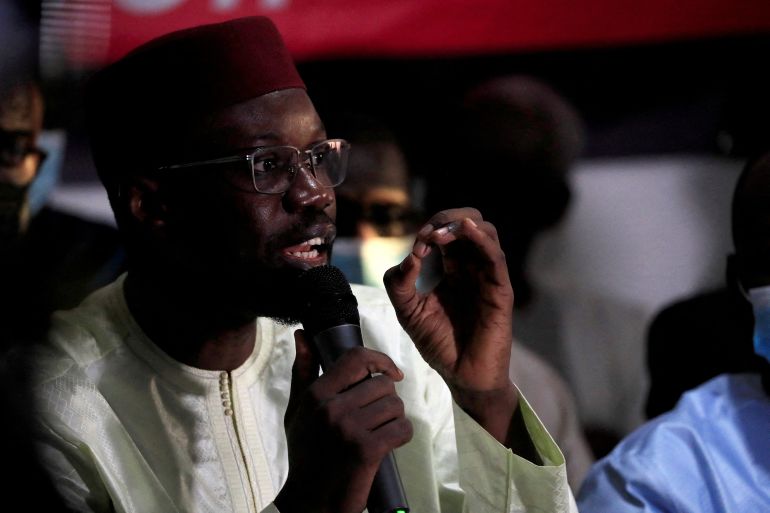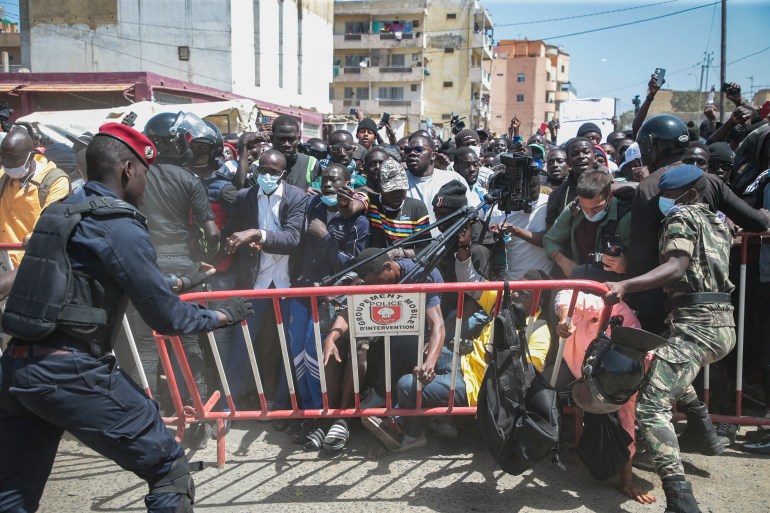Senegalese women fear rights setback over Sonko rape trial
The high-profile case involving opposition leader Ousmane Sonko has dismayed feminists as they await a verdict.

A rape case against Senegal’s most prominent opposition leader has dismayed feminists in the country, who now fear that their cause has suffered an enduring blow.
After a politicised trial marked by salacious headlines, the West African state is bracing for potential violence on Thursday when the verdict is expected to be announced.
Keep reading
list of 3 itemsSenegal opposition leader trial kickstarts rocky election season
Senegal opposition leader Sonko to face trial over rape charges
The case revolves around Ousmane Sonko, a firebrand politician whose attacks on Senegal’s elite have drawn a huge following among young people. The 48-year-old is accused of raping Adij Sarr, 23, a beauty salon employee, and issuing death threats against her. He has denied the allegations.
In the run-up to Thursday’s hearing, he called on the public to protest en masse.
Some feminists said the two-year-old case has sidestepped a rare chance to advance the rights of victims of sexual violence. Others worried it will mark a step backwards in the long struggle for female empowerment in the West African state.
“This trial is a huge setback that will leave its mark on the history of women’s rights,” said Aminata Libain Mbengue of the Feminists’ Network of Senegal (RFS).
Death threats
Sonko says the case is part of a plot by President Macky Sall to scuttle his ambitions for the 2024 elections. His critics call him a rabble-rouser who is seeking to evade justice.
When Sonko was charged in 2021, riots and looting erupted and killed a dozen people.

Sarr was forced into hiding after facing relentless threats and insults. Now she only leaves her home under police escort.
“Whatever the verdict, [she] has already been given life imprisonment,” Mbengue said. “She has lost all freedom.”
Victim-shaming and culture of silence
Activists said the trial has left the rights of women and victims of sexual violence either drowned out as an issue or sidelined. Campaigners have not only been threatened by Sonko supporters, but many feel that the cause has also failed to gain more attention and support because of Sarr herself.
Her appearance has been widely attacked as vulgar and her testimony as crude, prompting headlines of “X-rated” and “like a porn movie” in the conservative Muslim country.
“Rape is a very painful ordeal,” and victims are “ashamed and hide their faces”, journalist Amy Wane said. Sarr, on the other hand, has been criticised for “flaunting herself” on social media and showing up to court in a “tight red dress”.
Sociologist Rosalie Aduayi Diop, a specialist in sexual violence, described the trial as “theatre.” She criticised the justice system, saying the trial unveils its limits and brims with “untruths from all sides”.
On Friday, the RFS feminist collective released a statement slamming Sonko and the government of Senegal, which, it said, still robs women of their rights.
“The fight for women’s rights in Senegal remains a fight that is certainly endless, but for which we do not shirk at any time,” the statement read.
Despite the country criminalising rape in 2019, activists said survivors face many obstacles, including cumbersome procedures, unsupported management of their traumas and the scarcity of shelters.
Rape remains a taboo in Senegal, and Diop said most victims are unaware of the law and a “culture of silence” persists.
“We always try to work things out within the family,” she said, both to preserve family ties and to avoid “stigmatising” victims.
Some activists said Sarr’s testimony failed to dispel all doubts about the allegations against Sonko.
However, Sonko’s condescending language and his “normalisation” of sexual violence has been condemned in totality. “If I wanted to rape a woman, I wouldn’t choose a brain-damaged monkey,” he said.
In its statement, RFS said Sonko’s remarks perpetuate the damaging stereotype of a “perfect rape victim”.
“All persons, no matter their background and status can be victims of rape,” it said.
The group said the fact that Sonko’s words were eagerly received and admired by a population made up mainly of young people was a grave concern, particularly for survivors of rape.